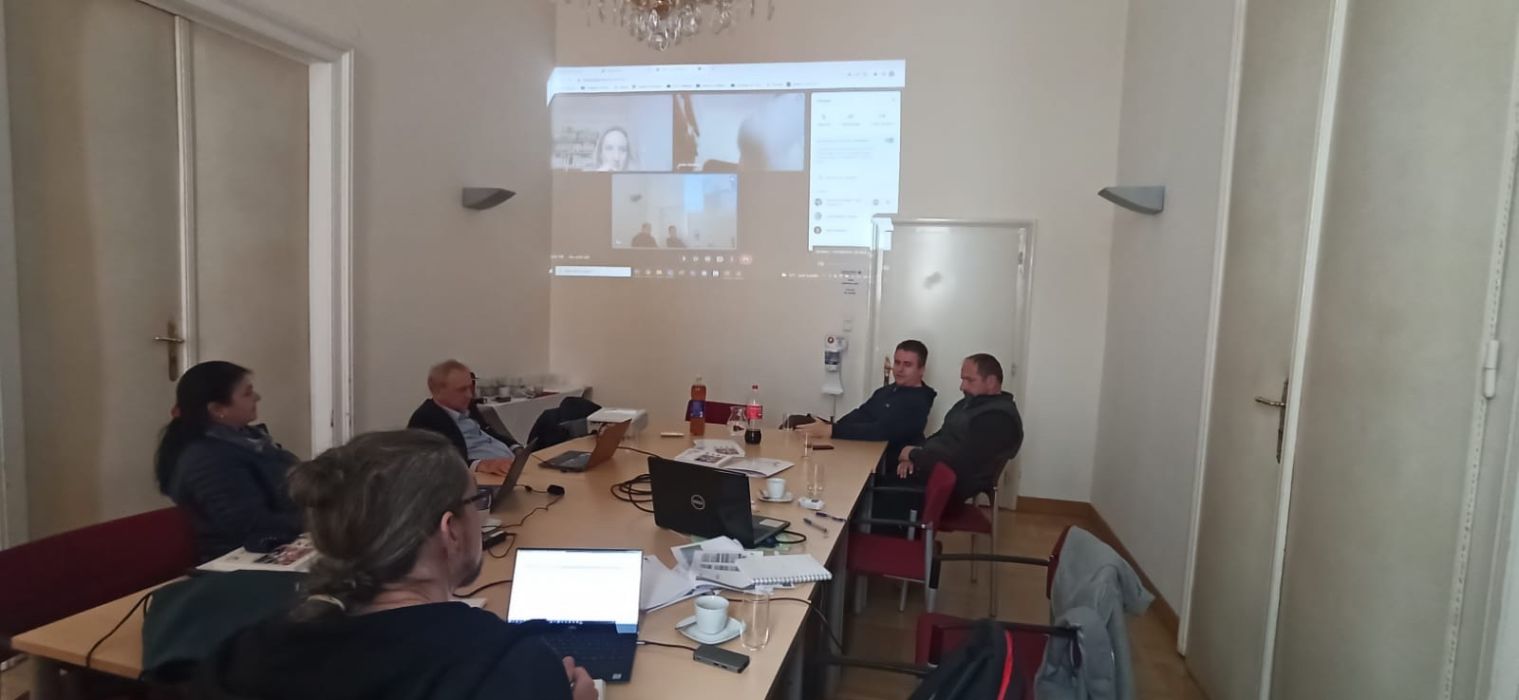NEWS

INTERNATIONAL MEETING UNDER THE SEEYOU PROJECT WAS HELD IN VIENNA


09.04.2022
An international meeting under the South-East European Youth Parasport Exchange –SEEYou project was held in Vienna, Austria on 07–09 April 2022, during which the partners discussed the sports camps for children with intellectual disabilities held in the partner countries, as well as the training of sports specialists working with them, organized so far. The forthcoming activities were also planned, including a sports camp and training of sports specialists in Milanovac, Serbia, which will take place in September 2022. Training and sports activities contribute to the development of sports for people with disabilities in partner countries – Croatia, Serbia, Greece, Belgium, Bulgaria and Germany. The meeting was attended by Stefka Djobova – a representative of the partner organization from Bulgaria – Bulgarian sports development association.
There are an estimated 80 million people with a disability in Europe, equivalent to approx. 15% of the EU population. Sport is recognized as a tool to promote the social inclusion of people with a disability.
Benefits of sport for people with a disability:
• Health and wellbeing;
• Individual development;
• Social benefits, including social inclusion.
Despite the benefits of sport, people with a disability are less likely to participate in organized sport practiced in sport clubs than able-bodied people. This might be due to the fact that para-sport and, in particular, youth para-sport faces a number of challenges that do not allow para-sport to make full use of its inclusive potential. This is especially relevant in the South-East European region.
BARRIERS TO PARTICIPATION OF PEOPLE WITH A DISABILITY IN SPORT:
• Environmental: Lack of opportunities to shift from physical activity to competitive sports; Lack of facilities and affordable equipment;
• Social: Lack of qualified (employed and voluntary) human resources who can provide both an entry into physical activity and sports (at any stage), but who also can sustainably accompany and guide lifelong physical activity pathways;
• Lack of comprehensive strategies, advocacy, outreach to policy makers and policies;
• Individual: Lack of awareness of people with a disability concerning the benefits and opportunities of sport and physical activity as regards its potential to enhance their health and to promote their inclusion.
In order to strengthen South-East European youth para-sport structure, and thus promote the long-term participation of young para-sport athletes in grassroots and competitive sport in the region, barriers to participation need to be addressed. Barriers can be addressed by promoting exchange, mutual learning and coordinated advocacy as well as developing cooperation.
THE SPECIFIC OBJECTIVES OF THE SOUTH-EAST EUROPEAN YOUTH PARASPORT EXCHANGE SEEYOU PROJECT ARE:
• Supporting youth exchange in para-sport from South-Eastern Europe and raising awareness on the identified approaches (thus address the economic barrier of the lack of opportunities to shift from physical activity to competitive sport);
• Provide cooperative training opportunities for youth para-sport coaches from South-East Europe (thus address the social barrier of the lack of qualified human resources);
• Establish sub-regional and cross-sectoral cooperation strategy (thus address the social barrier of the lack of comprehensive strategies, advocacy, outreach to policy - makers and policies.
THE ACTIVITIES OF THE PROJECT ARE:
• Organization of three Youth Para-Sport Training Camps for South-East European young para-sport athletes including training, competition as well as parallel activities around education, cultural and social activities;
• Awareness Raising Campaigns around the Training Camps;
• Organization of three Youth Para-Sport Coaching Workshops;
• Organization of a sub-regional and cross-sectoral Cooperation Symposium;
• Establishment of a sub-regional and cross-sectoral Cooperation Strategy and Roadmap.
The partnership consists of various stakeholders from the South-East European region, namely National Paralympic Committees, public authorities and specialized sport-related organizations from Croatia, Serbia, Greece, Belgium, Bulgaria and additionally Germany and the project partner from Bulgaria is Bulgarian sports development association. The project is co-funded by Erasmus+ Programme of the European Union.
Benefits of sport for people with a disability:
• Health and wellbeing;
• Individual development;
• Social benefits, including social inclusion.
Despite the benefits of sport, people with a disability are less likely to participate in organized sport practiced in sport clubs than able-bodied people. This might be due to the fact that para-sport and, in particular, youth para-sport faces a number of challenges that do not allow para-sport to make full use of its inclusive potential. This is especially relevant in the South-East European region.
BARRIERS TO PARTICIPATION OF PEOPLE WITH A DISABILITY IN SPORT:
• Environmental: Lack of opportunities to shift from physical activity to competitive sports; Lack of facilities and affordable equipment;
• Social: Lack of qualified (employed and voluntary) human resources who can provide both an entry into physical activity and sports (at any stage), but who also can sustainably accompany and guide lifelong physical activity pathways;
• Lack of comprehensive strategies, advocacy, outreach to policy makers and policies;
• Individual: Lack of awareness of people with a disability concerning the benefits and opportunities of sport and physical activity as regards its potential to enhance their health and to promote their inclusion.
In order to strengthen South-East European youth para-sport structure, and thus promote the long-term participation of young para-sport athletes in grassroots and competitive sport in the region, barriers to participation need to be addressed. Barriers can be addressed by promoting exchange, mutual learning and coordinated advocacy as well as developing cooperation.
THE SPECIFIC OBJECTIVES OF THE SOUTH-EAST EUROPEAN YOUTH PARASPORT EXCHANGE SEEYOU PROJECT ARE:
• Supporting youth exchange in para-sport from South-Eastern Europe and raising awareness on the identified approaches (thus address the economic barrier of the lack of opportunities to shift from physical activity to competitive sport);
• Provide cooperative training opportunities for youth para-sport coaches from South-East Europe (thus address the social barrier of the lack of qualified human resources);
• Establish sub-regional and cross-sectoral cooperation strategy (thus address the social barrier of the lack of comprehensive strategies, advocacy, outreach to policy - makers and policies.
THE ACTIVITIES OF THE PROJECT ARE:
• Organization of three Youth Para-Sport Training Camps for South-East European young para-sport athletes including training, competition as well as parallel activities around education, cultural and social activities;
• Awareness Raising Campaigns around the Training Camps;
• Organization of three Youth Para-Sport Coaching Workshops;
• Organization of a sub-regional and cross-sectoral Cooperation Symposium;
• Establishment of a sub-regional and cross-sectoral Cooperation Strategy and Roadmap.
The partnership consists of various stakeholders from the South-East European region, namely National Paralympic Committees, public authorities and specialized sport-related organizations from Croatia, Serbia, Greece, Belgium, Bulgaria and additionally Germany and the project partner from Bulgaria is Bulgarian sports development association. The project is co-funded by Erasmus+ Programme of the European Union.

 Български
Български














































